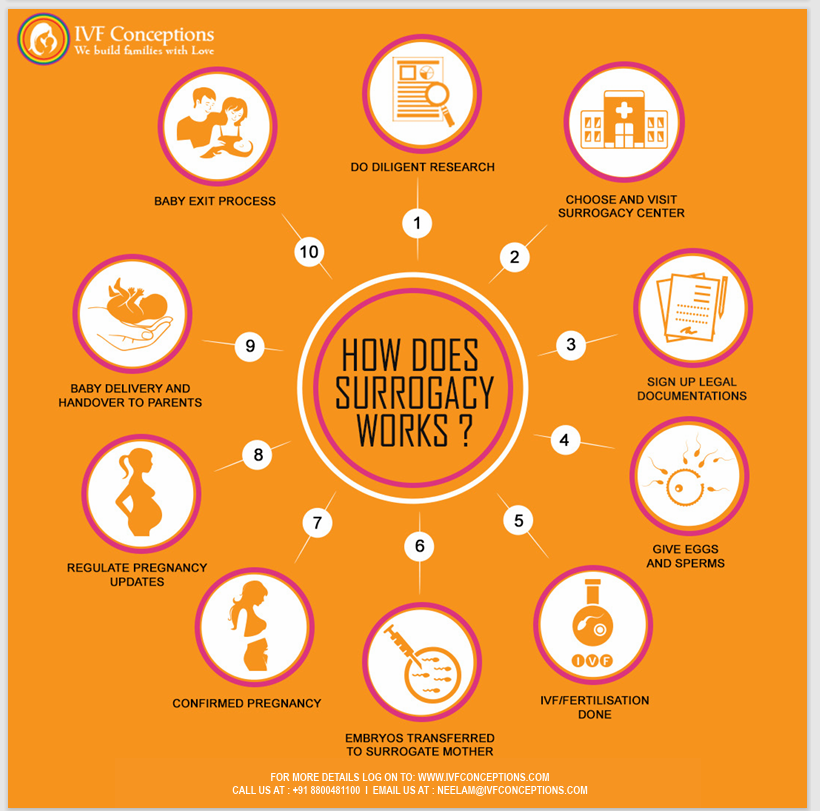Moving From Infertility Treatment To Surrogacy Process

When IVF Fails: Navigating the Emotional and Practical Steps Towards Surrogacy
Moving From Infertility Treatment To Surrogacy Process – Infertility is a challenging journey that impacts millions of couples globally. While advancements in reproductive medicine have provided hope, many individuals still face difficulties in conceiving or carrying a pregnancy to term. This often leads them to explore alternative family-building options. One of the most effective solutions is gestational surrogacy, where a surrogate mother carries a baby for the intended parents.
- Book an online appointment: Get a free online consultation.
- Call\W:+91-8800481100 Email:neelam@ivfconceptions.com
This third-party reproduction method offers a path to parenthood for those struggling with infertility. In this article, we’ll explore how transitioning from infertility treatments to surrogacy can help you achieve the dream of growing your family.
The surrogacy process involves a range of legal, medical, and emotional considerations, making it a complex and often overwhelming option for those seeking to expand their family.
More Resources to Read:
Infertility Treatment and Surrogacy Process
9 Factors To Improve IVF Pregnancy Rate
International Surrogacy Options Worldwide
Surrogacy Guide for Surrogate Mothers
In recent years, there has been a significant shift towards surrogacy as a means of starting a family, with many individuals and couples opting to move away from traditional infertility treatments.
In this article, we will delve into the reasons behind this shift and explore the process of moving from infertility treatment to surrogacy, probably after years of TTC, providing a comprehensive overview of what individuals can expect on their surrogacy journey.

Infertility is a deeply challenging and emotional journey for couples who desire to conceive a child. It refers to the inability to achieve pregnancy after a year or more of regular unprotected intercourse.
The physical and emotional toll that infertility takes on individuals and couples cannot be understated. Fortunately, there are various infertility treatment options available to help couples overcome this hurdle.
Fertility medications, such as hormone therapies, can help regulate ovulation and increase the chances of successful conception. The other assisted reproduction technique (ART), such as Intrauterine insemination (IUI) involves placing sperm directly into the uterus during the ovulation period to enhance the chances of fertilization.
In more complex cases, in vitro fertilization (IVF) may be recommended, where eggs are retrieved and fertilized outside the body before being implanted into the uterus.
However, despite the advancements in infertility treatments, some couples may find that these options are not successful or feasible for their specific circumstances. This is where the topic of moving from infertility treatment to surrogacy arises as a potential solution for couples who have exhausted other options.
Understanding Surrogacy
Surrogacy is a complex and deeply personal decision that many couples or individuals may consider as a pathway to parenthood when traditional infertility treatments have been unsuccessful. Surrogacy involves a woman, known as the surrogate, carrying and delivering a child on behalf of another person or couple, known as the intended parents.
There are two main types of surrogacy: traditional surrogacy and gestational surrogacy.
In traditional surrogacy, the surrogate uses her own egg, making her the genetic mother of the child.
In contrast, gestational surrogacy involves the use of in vitro fertilization (IVF) to create an embryo using the intended parents’ or donors’ egg and sperm, which is then transferred to the surrogate’s uterus. In this case, the surrogate is not genetically related to the child she carries.
Legal and ethical considerations play a crucial role in the surrogacy process. It is essential for all parties involved to have a legally binding contract that clearly outlines rights, responsibilities, and expectations. This contract should address issues such as the surrogate’s compensation, medical expenses, and the intended parents‘ legal rights as the child’s legal parents. It is important to consult with legal professionals experienced in reproductive law to ensure that the contract is comprehensive and protects the interests of all parties involved.
Common misconceptions and concerns about surrogacy often revolve around the average surrogacy cost, the selection process for a surrogate, and the emotional implications. Surrogacy can indeed be expensive, with costs varying depending on factors such as medical procedures, legal fees, and compensation for the surrogate.
However, it is possible to explore different financial options, such as surrogacy agencies or financing programs, to make the process more affordable.
The selection process for a surrogate typically involves careful screening and matching to ensure compatibility and shared values between the intended parents and the surrogate. Emotional support is crucial for all parties involved, as surrogacy can bring about a range of emotions and complexities. Professional counseling or support groups can provide guidance and help navigate the emotional journey throughout the surrogacy process.
Understanding surrogacy is an important step for individuals or couples considering this alternative path to parenthood. By defining surrogacy, explaining the different types, discussing legal and ethical considerations, and addressing common misconceptions, individuals can make informed decisions as they navigate the transition from infertility treatments to the surrogacy process.

Making the Decision
Deciding to pursue surrogacy is influenced by a range of factors.
- Couples may find themselves considering surrogacy after repeated failed infertility treatments, where other options have been exhausted.
- Medical conditions that prevent pregnancy, such as uterine abnormalities or certain genetic disorders, can also lead couples down the path of surrogacy.
- Additionally, same-sex couples who desire biological children may see surrogacy as a means to achieve their dreams of parenthood.
The emotional journey of deciding to pursue surrogacy can be challenging and filled with grief. Coming to terms with the reality of not being able to carry a child biologically can be a profound and deeply personal experience. It requires acceptance, understanding, and support from loved ones and professional counseling to navigate the complexities of this decision.
When considering surrogacy, it is crucial to evaluate the financial, legal, and emotional aspects involved. Financially, intended parents must assess the costs associated with the surrogacy process, including medical expenses, legal fees, and compensation for the surrogate.
Legal considerations involve understanding the surrogacy laws and regulations in your jurisdiction to ensure a smooth and legally protected process.
Finally, the emotional aspects of surrogacy should be carefully examined, both for the intended parents and the surrogate, to ensure that everyone involved is prepared and supported throughout the journey.

The Surrogacy Process
Once the decision to pursue surrogacy has been made, the surrogacy process begins with finding a suitable surrogate. This can be done through various channels, including surrogacy agencies, online platforms, or personal connections. It is essential to thoroughly screen potential surrogates, both medically and psychologically, to ensure they meet the necessary criteria and are prepared for the journey ahead.
Once a surrogate has been selected, legal agreements are crucial to protect the rights and responsibilities of all parties involved. These agreements outline the expectations, financial arrangements, and legal aspects of the surrogacy arrangement. Seeking the guidance of an experienced reproductive attorney is highly recommended to ensure all legal requirements are met.
The next step in the surrogacy process involves the IVF procedure. This is where the intended parent’s genetic material, whether through their own gametes or donated gametes, is combined and transferred to the surrogate’s uterus. Close coordination between the fertility clinic, the surrogate, and the intended parents is vital during this phase to optimize the chances of a successful pregnancy.
Throughout the surrogacy journey, open communication and building a strong relationship with the surrogate are paramount. Regular and honest conversations about expectations, boundaries, and emotional well-being can help foster a supportive environment for all parties involved. Maintaining open lines of communication can help address any concerns or challenges that may arise along the way.
While the surrogacy process offers hopeful parents a path to parenthood, it is not without its obstacles. Challenges such as legal complexities, medical setbacks, and emotional hurdles are common. It is crucial to approach these challenges with patience, understanding, and a strong support system. Seeking guidance from support groups, therapists, or other couples who have gone through the surrogacy journey can provide valuable insights and guidance.
Additional guide for intended parents:
Best surrogacy agency in India
Best surrogacy agency in Mexico
Best surrogacy agency in Colombia
Best surrogacy agency in Argentina
Best surrogacy agency in Georgia
Best surrogacy agency in the USA
Best surrogacy agency in Ukraine
Best surrogacy agency in Armenia
Conclusion
In conclusion, the decision to move from infertility treatment to the surrogacy process is a deeply personal one and should not be taken lightly. It is important for couples to carefully consider all options and consult with medical professionals and surrogacy agencies to ensure the best possible outcome. While the journey may be challenging, the reward of finally achieving parenthood is priceless.
With the support of a surrogate and a strong support system, couples can navigate through the surrogacy process with hope and determination. Remember, there is no one “right” way to build a family, and choosing surrogacy is a brave and admirable choice.
If you’d like to learn more about IVF, Egg Donation, or surrogacy services globally, check out the rest of our website at Complete Surrogacy Agency. We offer legally secure and affordable surrogacy consulting services for FREE.
For more resources on IVF and Surrogacy, browse our other web page- IVF Conceptions.
For more resources on IVF and Surrogacy, browse our other web page- Georgia Surrogacy Agency.
Complete Surrogacy: Your Trusted Partner in International Surrogacy
At Complete Surrogacy, we have over 15 years of experience in international surrogacy, guiding 4,000+ intended parents worldwide. We provide safe, ethical, and affordable surrogacy solutions for single parents, LGBTQ+ couples, and heterosexual couples.
As members of EFS and ESHRE, we adhere to the highest ethical and professional standards. Our expert team is committed to providing accurate, compassionate, and transparent guidance, ensuring a legally secure and smooth journey to parenthood.
Let us help you build your family with trust, care, and integrity.
Get in touch for one FREE Surrogacy Consultancy!
References used:
FAQs for Moving From Infertility Treatment To Surrogacy
What factors should couples consider when deciding to move from infertility treatment to the surrogacy process?
Couples should consider several factors when deciding to move from infertility treatment to the surrogacy process.
- Firstly, they should evaluate the success rate of infertility treatments they have already undergone and explore if surrogacy offers a higher chance of success.
- Secondly, they should consider the emotional and physical toll of continuing infertility treatments versus opting for surrogacy.
- Additionally, they should assess their financial situation and determine if they can afford the costs associated with surrogacy.
- Lastly, couples should consider their personal values, beliefs, and desires for biological connection when deciding if surrogacy is the right path for them.
What are the legal and ethical considerations involved in the surrogacy process?
The legal considerations in surrogacy involve the establishment of legal rights and responsibilities of all parties involved, such as the intended parents, the surrogate mother, and the child.
This includes drafting and signing contracts, determining custody and parental rights, and complying with relevant laws and regulations.
Ethical considerations revolve around ensuring informed consent, protection of the surrogate’s physical and emotional well-being, fair compensation, and avoiding exploitation or coercion.
How does the cost of surrogacy compare to ongoing infertility treatments?
The cost of surrogacy is generally higher than ongoing infertility treatments. Surrogacy involves various expenses such as surrogate compensation, agency fees, legal fees, medical expenses, and insurance costs.
These expenses can range from tens of thousands to hundreds of thousands of dollars. The typical average cost of surrogacy in the USA is $150,000+. On the other hand, in countries like Mexico, Georiga, Ukraine, Colombia, and Argentina the cost of surrogacy is in the range of $50,000 to $70,000.
On the other hand, ongoing infertility treatments such as in vitro fertilization (IVF) have their own costs, but they are typically lower than surrogacy. IVF costs can vary depending on the specific treatment plan and clinic, but they usually range from around $10,000 to $20,000 per cycle. It’s important to note that these costs can vary greatly depending on individual circumstances and location.
What are the steps involved in finding and selecting a surrogate for the surrogacy process?
The steps involved in finding and selecting a surrogate for the surrogacy process typically include researching and selecting a reputable surrogacy agency, completing an application and screening process, matching with a potential surrogate, conducting interviews and background checks, establishing legal agreements, and beginning the medical and fertility process. It is important to ensure that the surrogate is physically and emotionally prepared for the journey and that the intended parents and surrogate have strong and open communication throughout the process.

Author Bio: Neelam Chhagani is an International Surrogacy Expert with 15 years of experience in the fertility and surrogacy domain. As the founder of IVF Conceptions and Complete Surrogacy, she has guided over 4,000 intended parents worldwide on their surrogacy journey to parenthood. Recognized as a trusted authority, she specializes in holistic infertility solutions and third-party reproduction consulting.
Holding an MA in Counselling Psychology and a PGD in Mental Health, Neelam is a proud member of the European Fertility Society (EFS) and the European Society of Human Reproduction and Embryology (ESHRE). She is also a leading surrogacy blogger, providing valuable insights into ethical and practical surrogacy solutions.
Since 2010, committed to supporting ALL family types, Neelam has been passionate about helping intended parents grow their families with compassion, integrity, and a focus on secure and affordable surrogacy options Globally.
Learn more about Neelam:
https://www.ivfconceptions.com/neelam-chhagani-surrogacy-consultant/
https://www.linkedin.com/in/neelam-chhagani-92892229/















I was introduced to Neelam by a friend who worked with Neelam for surrogacy. Neelam is absolutely wonderful. I am a single male and the journey to fatherhood is not that easy. Neelam connected me to a program ideal for my circumstances. She was with me throughout the pregnancy providing advice and guidance along the way. I am so grateful I found her and am thrilled today that I have a beautiful daughter. I highly recommend Neelam to anyone who is on a journey to become a parent. Having a child has changed my world for the better. I wish others success with their own journey and recommend you connect with Neelam to find a path that is best for you.
SA (USA)